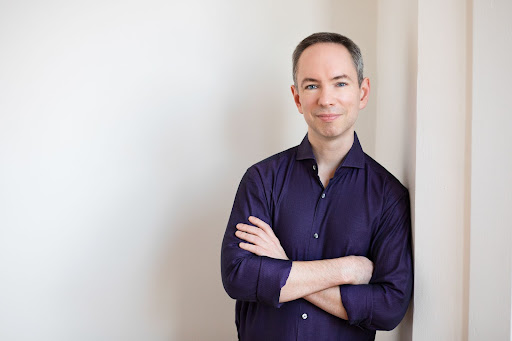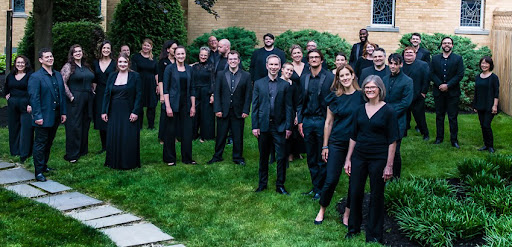by Daniel Hathaway

The program, “Of Sound Mind: From Darkness into Light,” explores the universality of grief and sorrow, helping us to embrace our common humanity in the struggles we individually and collectively experience. Free performances will take place on Saturday, February 18 at 7:30 pm at St. Noel Church in Willoughby Hills and on Sunday, February 19 at 3:00 pm at the Maltz Performing Arts Center in Cleveland. A pre-concert talk with Oberlin musicologist Charles Edward McGuire will begin 30 minutes prior to each performance.
After their Cleveland concerts, the Choir will perform at the 2023 National Conference of the American Choral Directors Association in Cincinnati later this month. Of the hundreds of choirs from across the country that auditioned, CCC was one of 28 choirs invited to perform, and will send 32 singers to perform two 25-minute performances to thousands of attendees.
I reached Gregory Ristow by telephone to chat about the repertoire for this weekend, and began by asking how much input he had into the program.
Gregory Ristow: “I was able to choose about 35 to 40 percent of the music myself. The rest was already set. A significant part of that is music that we’ll also perform at the ACDA National Convention in Cincinnati. That program has been set for over a year — when you apply to perform at ACDA you submit your program, so that’s been fixed in stone.
The theme “Of Sound Mind: From Darkness into Light” has been set since last year as planning for the season began. The focus of the concert is mental health and wellbeing, and the music speaks to that in both direct and indirect ways.
Two pieces from Brahms’ Six Quartets Op. 112, “Sehnsucht” and “Nächsten,” are from before a time when we had terms like mental health, mental illness, and depression, but speak to something that is universal and timeless: the longing and desire to go from darkness to light. And works like Aron Accurso’s Mental Health Suite are very directly written to address and destigmatize conversations about mental health.
Daniel Hathaway: Surely Brahms was familiar with those issues through his relationship with Robert Schumann.
GR: In Schumann’s case, his own mental illness was probably brought on by syphilis and having to be in an asylum. These issues are ever present, but how we talk about them has changed a lot. And what it means to suffer from a mental illness in society and seek treatment has changed a lot as well.
DH: How have you prepared for designing this program?
GR: I’ve been reading a lot of statistics on mental health in the United States. I was shocked to read that one out of five people in a given year will suffer a mental illness, and fewer than 50 percent will receive treatment for that. And on average, the time between the onset of symptoms of a mental illness and treatment is eleven years — from a combination of the stigma around mental health, from lack of access, and also because it’s really hard to self-diagnose and recognize that it’s time to seek out treatment.
DH: Does this topic present both opportunities and challenges for marketing a choral concert?
GR: Good question. It’s a serious concert that has a lot of hope in it, because we do need to change the conversation about mental illness. There is hope, there are effective treatments, and over 50 percent of people will suffer from a mental illness over the course of their lifetime. It’s more normal than abnormal to face these issues. And people are dealing with them, and are recovering from them, and learning to live with them in ways that don’t dominate their life.
DH: What are some highlights in this program?
GR: That’s like picking who your favorite child is! We’re opening the concert with On the Air (Dear Vaccine) by Cecilia McDowall, a piece that was written for Cleveland Chamber Choir. It’s effectively a prayer to let us get back to singing post-COVID pandemic. We know how much the pandemic disrupted choral singing, but it was also responsible for a 25 percent increase in anxiety and depression across the world, according to the World Health Organization. So we start by looking backward at where we’ve come from.
With the Brahms, we explore darkness and longing in an unresolved way, then in Julio DiCarlo’s Into the Orange (the color), we learn about his 9-year-old son, who is non-verbal, on the autism spectrum, and communicates only through the computer. Before he learned to do that, he found himself in “a wash of orange.” It only lasts four minutes, but it’s just incredibly beautiful, and starts to turn the corner.
In the second part of the concert, the text of Dale Trumbore’s Perhaps talks about the hope that music can help us answer unanswered questions.
And in “A Thought Storm,” the second movement of Aron Accurso’s You Are Enough: A Mental Health Suite, the composer splits the ensemble into two choirs, one negative, one positive, which many singers have related to the self-doubts they have experienced after an audition.
We’ll end with our own Corey K. Rubin’s setting of Tagore’s Gold on Every Cloud, which is about coming out of a dark period — in his case a physical illness — into a wash of beautiful sonic light.
DH: How did your Oberlin students deal with the pandemic?
GR: As well as could be hoped. We rehearsed and performed outside, and made use of technology. Now we’re immensely grateful for every rehearsal. A lot of us were really worried about ever being able to sing together again. And now, for me, Cleveland Chamber Choir is an unexpected opportunity to be making music at a very high level.
Photos by Tanya Rosen-Jones and Elisa Vietri
Published on ClevelandClassical.com February 15, 2023.
Click here for a printable copy of this article



